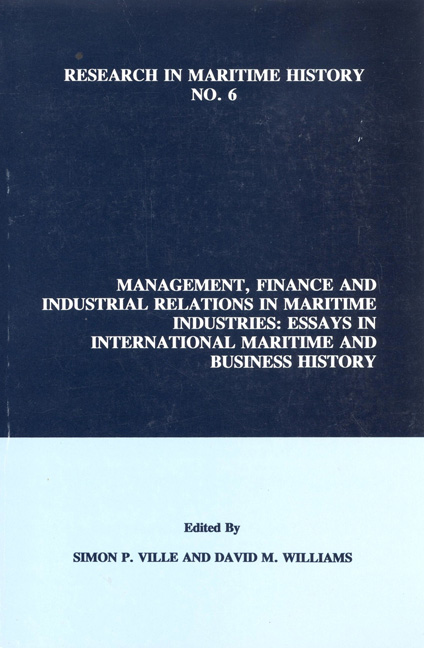 Management, Finance and Industrial Relations in Maritime Industries
Management, Finance and Industrial Relations in Maritime Industries Book contents
Introduction
Summary
Maritime and business history are two fields of economic history that have generated immense scholarly interest in recent decades. While maritime history has a long and distinguished pedigree, the formation of the International Maritime Economic History Association in 1986 and the launch of its specialist journal, the International Journal of Maritime History, in 1989, have provided new impetus. That maritime history has taken on a new dimension and embraced novel approaches is clear from a recent historiographie survey by David Williams. Likewise, business history has undergone enormous expansion; its growth and specialist subfields are evidenced by new journals, such as Accounting, Business and Financial History (1991), together with new societies, including the Association of Business Historians, founded in Britain in 1992.
It is highly appropriate that these two areas should be foci within economic history. Man's relationship to the sea is an established theme, for the sea occupied a crucial position in human history by directly affecting the experiences and lifestyles of communities on or near the coast. Moreover, as inland transport links became more extensive, the hinterland of seaward influence expanded. The sea was not only a means of transport but also an important resource, primarily as a source of food. Significantly, in the context of global development, the sea provided the means to expand horizons and to facilitate contacts with other civilisations. Mankind's knowledge of world resources and opportunities was acquired through this medium. The development of a modern, integrated world economy in the past two centuries is a direct consequence of man's growing skills in traversing the sea and harnessing technology. The increasing mobility of people, goods, ideas, and information underlies the spread of economic development; in global terms, until the beginning of real commercial aviation after World War II, such movements were almost solely functions of maritime acumen.
The growth of big business has been equally seminal to modern historical development. Indeed, Alfred Chandler has suggested that the large-scale companies which have evolved since the mid-nineteenth century are the most efficient means of conducting business. As well, the “visible hand” of corporate decision-making has exercised a major influence on economic development.
- Type
- Chapter
- Information
- Management, Finance and Industrial Relations in Maritime IndustriesEssays in International Maritime and Business History, pp. ix - xivPublisher: Liverpool University PressPrint publication year: 1994


